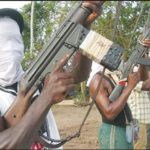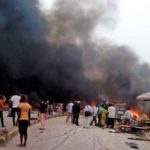Hospitalized victims of the latest mass murder allegedly perpetrated by killer herdsmen in Plateau state communities have shared their sad and sorrowful stories on the devastating effect the killings had on their lives.
Even a heart made of stone will melt at the sight of victims of last weekend’s bloody attack by Fulani herdsmen on 11 communities across three local government areas of Plateau State.
At the Jos University Teaching Hospital (JUTH), where scores of them are battling for survival, you will see men and women screaming in pains to the extent that it will make you develop goose pimples.
Inside the wards, you see individuals butchered like animals, just hanging by the thread of life. A particular man was roasted like an offering for some deities. Even kids were not spared. The people are, indeed, in pains and sorrow.
Some of the victims were allegedly attacked by military men who were supposed to offer them protection. And as they were killing the people, they searched their pockets to know if they had money or phones to steal.
Narrating what he saw on the bloody day, 23-year-old Joseph Yakubu said: “I was attacked on Wednesday night at Angulu-Jos. We got information that some Hausa boys wanted to come to attack our community, and my elder brother had gone to the Muslim community to see his friend.
“I decided to go and call him and I met some Hausa boys wearing block cloths and holding machetes. They asked me why
“I was in their community and I told them I came to see my brother, but they refused to listen to me. They started beating me and hacked me with machete on my head, hand and my stomach. I escaped from the scene narrowly and was taken to the hospital.”
Also, Chong Dung from Maraban-Jam gave his own account thus: “I was attacked last Sunday at Maraban Jama’a.
“I was in my house and my friend told me that there was a protest at Maraban Jama’a where there was roadblock. I came out to go and see what was going on, but l later decided not to go.
“I went into a shop to buy recharge card and as I was coming out, I saw a convoy of military officers shooting everywhere and the bullets got me and I was later stabbed with knife on my neck. The person was in the military vehicle and they left.”
For Philemon Washinging from Ruku village, it was a miracle that he is still alive as he was roasted by his attackers.
“It was at about 3:00p.m. I was at the back of my house and I saw the Fulani herdsmen coming towards my direction with weapons and we ran inside of our houses. They started shooting and burning our houses.
“The room that we ran to hide ourselves, they came and set fire on it. The fire burnt my face, my head, and my neck. They came and opened the door and we all lay down as if we were dead.
“They looked at us and concluded that we were dead and they left. They set the room on fire again and left, thinking that we are all dead and we remained quiet in the room until when they left.
It was when we heard people crying in the village that we came out and we discovered that 36 persons were killed and we were taken to the hospital,”
Washinging said.
Also another victim, Saty Wash from Gana-Rupp village said: “It was on Saturday at about 5:00p.m. We were at home and the Fulani climbed the hills and surrounded the entire village and started shooting people.
“We didn’t know that they will come down to the village and when we saw them, we called the security people, but they did not respond. The Fulani had a free day to carry out their operation and they left at about 11:00p.m.
“That was when the security came. Before then, we ran to a church where we hid and the Fulani where making efforts to come to the church, but the people resisted them with the help of some security people.
“About 39 persons were killed in that village and several others injured. It’s as if they wanted to clear the entire village, but God helped those who survived the killings. I was shot when I was trying to hide at about 8:30p.m, but I thank God that my family was saved.”
Another victim, Stephen Danjuma from Gana-Ropp, narrated: “It was Fulani people who came to attack us. They wanted to kill all of us, and they killed a lot of people in the village. I was shot once at the ribs and the bullet came out through the other side and tore my hand. It was people from the community that took me to the hospital.”
Istifanus Manasseh, from Zikereck, Gashish District, said: “It was on Saturday that we went for burial. After the burial, we were coming back and we were attacked on the way. We were inside our cars and the Fulani just opened fire and shot me at the back.”
Fidelis Yakubu, from Ruku village, also said: “We were at home in the afternoon working; we didn’t know that the Fulani have surrounded the village. They shot once into the air and all of them started running into the village.
“We were running to escape and they were shooting directly at us and killed several people. Corpses littered the entire village. I ran and hide somewhere, yet the Fulani met me there. They were shooting straight into the house and I was shot in the head and buttocks.
“They said if I don’t come out of the room they will burn me inside the room. As I was coming out from the door, one of them shot me and I fell down and held my breath and they told others that they have killed me.
“They took away my two handsets and searched my pockets to know whether I had money, but I wasn’t having anything on me, and they left. I stood up after they had left. I know all of them, they are my friends and their houses are close to mine.
“My entire family escaped and they are in the IDPs camp, but I lost my elder and younger brother, the younger brother to my wife and one of my uncles.”
For Emmanuel Shom, from Maraban Jama’a, the fear of the military is the beginning of wisdom. “There was a protest on Sunday evening at Angul-D and I heard that it was coming to Maraban Jama’a. I said that I was not going there and, suddenly, I saw convoy and there were several military persons. I heard gunshots and as I was about to run, they shot my hand,” he said.
10-year-old Meroth Danjuma from Ruku saw hell as she said that when the Fulani came and surrounded their village, they went back to their house with her mother and locked themselves inside the house.
While her elder brother was in the ceiling the Fulani came and tried to force their door open, but could not. “They broke the wall and were shooting randomly inside the room and got me on the stomach and hand, and I went blank.
“My mother was also shot. My elder brother dropped from the ceiling and took me to the bedroom where he placed me on water and I regained conscious- ness.
“The Fulani did not go; they set the house on fire and left, but we were not burnt. We passed the night on the ceiling until the following morning and we were taken to the hospital with my mother,” she narrated in agony.
Albert Sunday from Ex-Land, said: “I live with my aunt in the village and the Fualni came that fateful day. They started shooting; they killed my aunt and her little baby. They shot me, but I didn’t die. I pretended as if I was dead and they left. Later, I was taken to hospital.”
Speaking with Sunday Sun, Dr Jonathan Karshima, chairman, Medical Advisory Committee (CMAC), JUTH, said: “I am in charge of clinical services in the Jos University Teaching Hospital (JUTH). We received 51 victims and three were attended to and discharged on that Saturday and the remaining 48 are still in the hospital. The doctors are working to see those who can cope with home treatment to go.
“There were challenges that Sunday because it was sudden, but now we are trying to cope, most of them are stable. The big challenge was that because it was a crisis and all of them just came, we had little challenges with consumables for dressing and other things, but the state government has come with support.
“It has requested that all the bills for them should be sent to the state government that it will handle that. Some of them find it difficult to feed, but the hospital provides food free for those on admission.”



